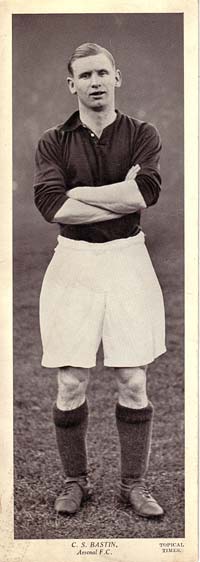
Cliff Bastin
Return to Exeter People Menu
Probably the greatest footballer to be born in
Exeter, Cliff Bastin became Arsenal's highest goal scorer until Ian
Wright in the 1990's, and was a stalwart of the 1930's England team.
Clifford Sidney Bastin was born in 40 New North Road, close to the Old
Fire House, on 14th March 1912, to Sidney Henry Bastin, a dairyman's
assistant and Maud Bastin (nee Butt). His family had moved to 190
Pinhoe Road by 1915, according to the street directories. Bastin showed
promise as a talented footballer playing as a schoolboy for Ladysmith
School when they won the Football Express Elementary Schools Challenge
Cup in 1925, and the English Schools in 1926. He scored six goals for
Ladysmith in April 1926 when they beat Newtown 7-1 in the Exeter
Schools' Final at St James' Park. Later, Bastin returned to the school
to be presented with his England cap by the Mayor; he would also visit
the school every summer with his international caps and medals and talk
to the boys.
His first game for Exeter City was with the Reserves in the Southern League against Bath City on Christmas Eve 1927, when he scored twice. Bastin's first game for Exeter City was on 14 April 1928, at the age of 16 years and 1 month. The match was against Coventry City and was a 0-0 draw. On his home début, the young Bastin scored twice in City's 5-1 win over Newport County. He scored 6 goals for Exeter in total by his 17th and last match. His record for Exeter was:
1927/28
3 appearances, 3 goals
1928/29 14 appearances, 3 goals
Herbert Chapman, the Arsenal manager had been
tipped off about a Watford player came down to St James' Park to
watch him play against Exeter. However, he was so impressed by the
young Bastin, a left winger, that he decided to sign him at the end of
the season. Bastin had to be persuaded to join Arsenal, and after
he agreed, he went out for a game of tennis. He cost Arsenal,
£2,000 and joined the club on 27 April 1929. Nicknamed 'Boy Bastin' in his time with
Arsenal, between 1929 and 1947, Bastin scored 150 League goals and 26
FA Cup goals and was part of an Arsenal FA Cup winning side in 1930 and
1936. He was part of the Arsenal team that won the First Division five
times in the 1930's. In the 1931-32 season, he scored 28 goals in 42
games and was the sides regular penalty taker. He was also the sides
highest goal scorer in the 1932/33 and 1933/34 seasons, scoring 33 and
15 respectively. His début for England was in 1931 and went on to
be
capped 21 times, finishing his international career in 1938.
Cliff Bastin played in the notorious friendly against Germany in May
1938 when the players gave the Nazi salute in the pre-game ceremonies.
England won 3-6 against a side that had a 16 game winning streak. Cliff
Bastin scored the first goal. Less controversially, Bastin appeared in
the film "The Arsenal Stadium Mystery" in 1939. The last game at
Highbury, before the outbreak of the Second War against Brentford was
used for filming the shots of the game in the film. The war intervened
when he was only 27. He was excused war service for failing the army
hearing test, and served as an ARP Warden at the Highbury Stadium. His
film appearance in 1939 was not his last - in 1942, Cliff Bastin played
a footballer in the classic British war film "One of our aircraft is
missing". He continued to play football in the war-time league that was
instituted for raising civilian morale. Bizarrely, Mussolini's Fascist
Italian Radio claimed in 1941 that he had been captured in the Battle
for Crete. He didn't play football again until after the war, when he
played 6 times, to retire in January 1947, having suffered with an
injury to his right leg in the 1938/9 season.
Cliff Bastin scored 178 goals in 395 games for Arsenal, a record that
remained until Ian Wright in 1997. In 1950, three years after his
retirement, a 19 year old Brian Glanville approached Cliff Bastin with
the idea of writing his biography. Bastin agreed and Glanville would
meet him on Sunday nights, in a room above the café on the North
Circular Road, that he ran with his wife. Glanville patiently teased
out his life story, trying to ensure accuracy, as Bastin was becoming
very deaf. During these sessions, Bastin's wife would supply the pair
with thick cut cheese sandwiches. The biography was published in 1950
after Glanville's father paid out £400 for the costs. Ironically,
a single copy with the original dust jacket will sell for around
£200 today. Cliff Bastin went on to run the Horse and Groom. He spent his final
years at 190 Pinhoe Road, Whipton,
in the house he lived in as a child and died in 1991 at the age of 79
in the Royal Devon and Exeter Hospital. Exeter City have named one of
its stands after him in his honour. Cliff Bastin can be seen playing in
the video Manchester United: The Official History 1878-2002.

│ Top of Page │